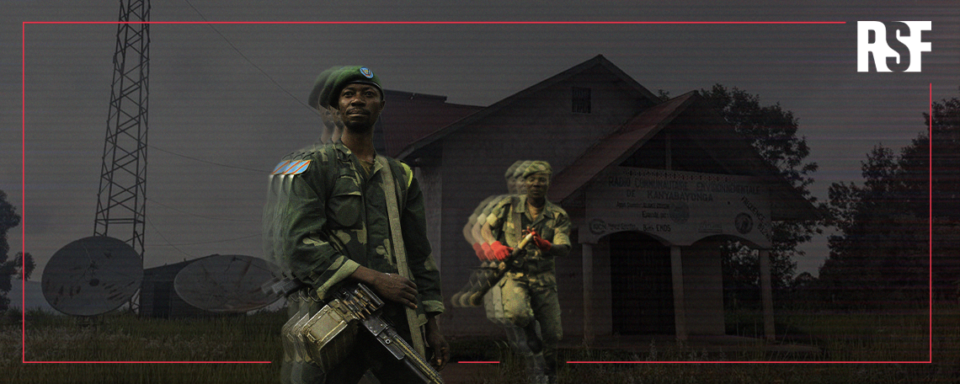In the east of the Democratic Republic of Congo (DRC), which is in the throes of armed conflict, members of the national army have taken over the premises of two community radio stations and set up military positions there within a week. Reporters Without Borders (RSF) condemns these hostage-takings, which prevent journalists from working, and calls on the authorities to protect local media as a matter of urgency.
Radio silence on Radio communautaire et environnementale de Kanyabayonga (RCEKA-FM) since Saturday 1 June. On that day, soldiers of the Armed Forces of the DRC (FARDC) burst into its premises in Lubero territory in North Kivu, in the east of the country, a conflict zone between the military and the M23 rebels. The journalists present all fled, leaving the radio station, located on a hill, in the hands of soldiers who had come to occupy it for strategic reasons. They now fear that the bombardments will reach these installations and destroy the radio’s equipment. On 10 June, explosives had already damaged part of the radio tower.
The premises of another community radio station, Radio Maendeleo Kaseghe, located on a hill in Lubero, were also raided by national army soldiers on 2 June. The clashes between militia and members of the national army left journalists largely exposed, caught in the crossfire. “Our equipment was damaged during the attack, and the journalists narrowly escaped death,” deplores the radio station’s director, Bienvenu Sengemoja Muhindo, who was forced to stop broadcasting and flee Lubero with his colleagues.
“Community radio stations run by local journalists are a valuable source of information, particularly in war zones. The fact that they are being held hostage by the military, trapping them under the fire of war, prevents journalists from doing their job and deprives tens of thousands of inhabitants of their right to information. This is a serious attack on press freedom to which the Congolese authorities must react urgently so that free information does not disappear in the east of the DRC.”
Sadibou Marong
Director of RSF’s Sub-Saharan Africa office
The targeting of local media such as community radio stations is not a new phenomenon. Their journalists are direct victims of the conflict between the FARDC and the M23 rebels in the provinces of North Kivu. Since February, Radio Communautaire Sake, also located on a hilltop in North Kivu, has also been occupied by soldiers – the FARDC and “wazalendo” militiamen, a coalition operating alongside the Congolese army – who have looted the equipment, forcing the staff to flee to Goma, the capital of North Kivu province.
On 3 February 2023, rebels looted the premises of Radio Bashali, located in the eponymous town. This was the second attack after the one in June 2022 against the La Voix de Mikeno station in Bunagana, in the same region, which was also looted and ransacked by armed rebels. In July 2023, M23 rebels ordered radio station managers to suspend a popular radio programme for two months. Members of the M23 have on several occasions visited the premises of radio stations producing or broadcasting the programme in order to threaten and intimidate them.

